The Third Ocean Conference- Reflections from Madam Secretary-General Leticia Carvalho on International Seabed Authority´s engagements
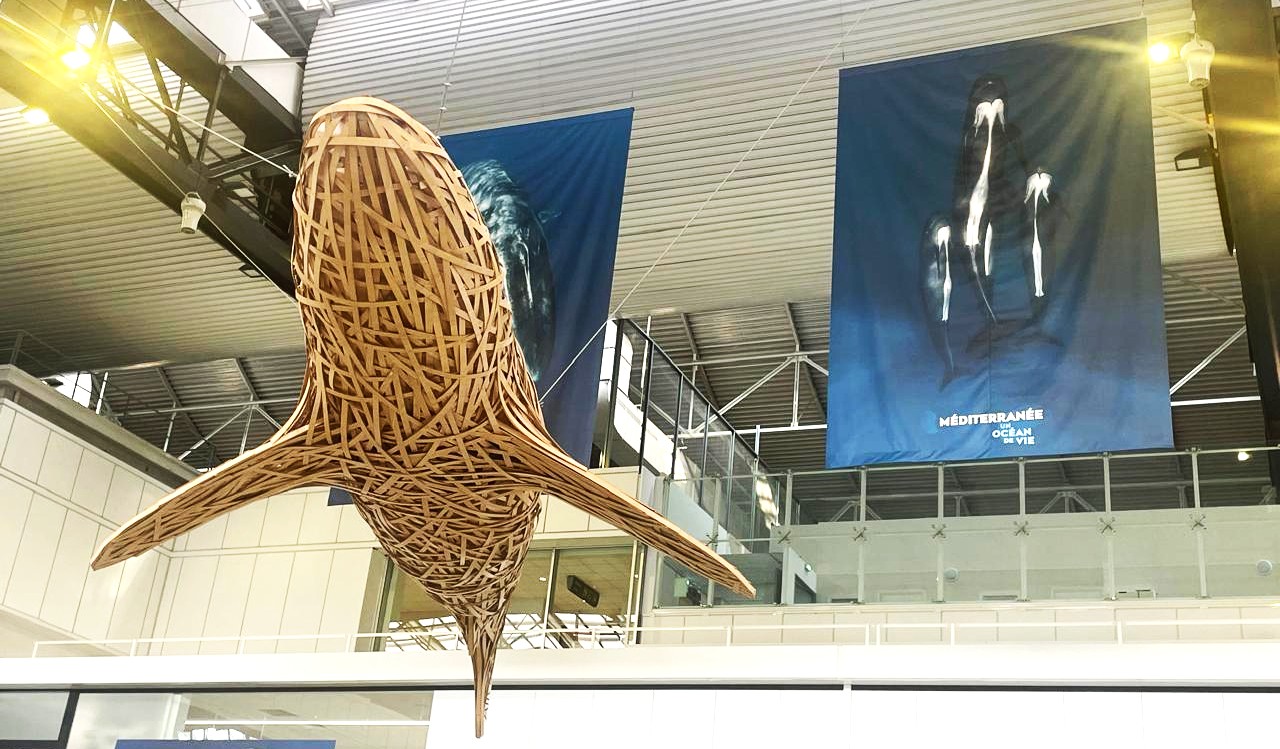
Last week, I attended the 2025 United Nations Ocean Conference in Nice, France, together with a small team from the International Seabed Authority (ISA) Office of Stewardship, Environment and Resources and Communications & Global Engagement Unit. From 7 to 13 June, the global ocean community came together to accelerate action and mobilize all actors in support of Sustainable Development Goal (SDG) 14: Conserve and sustainably use the oceans, seas and marine resources for sustainable development.
 The Conference’s ambition was to successfully build on existing instruments to optimize impact and form successful partnerships for the swift and effective implementation of ongoing processes that contribute to SDG14. In this context, I believe that the Conference was a fantastic success, with representation across the highest levels of government, private sector, civil society and technical experts on full display, attracting more than 14,000 delegates and observers, representatives from 175 States, including 75 Heads of State and Government with good representation from small island developing States (SIDS).
The Conference’s ambition was to successfully build on existing instruments to optimize impact and form successful partnerships for the swift and effective implementation of ongoing processes that contribute to SDG14. In this context, I believe that the Conference was a fantastic success, with representation across the highest levels of government, private sector, civil society and technical experts on full display, attracting more than 14,000 delegates and observers, representatives from 175 States, including 75 Heads of State and Government with good representation from small island developing States (SIDS).
The exceptionally well-organized and well-attended event, hosted by Costa Rica and France, made this success possible, including the gracious hosting of the Heads of State dialogue on the occasion of occasion of World Oceans Day, where guests were welcomed by President Macron. This event provided a unique chance for me to articulate the ISA’s mission and mandate directly at the highest political levels.
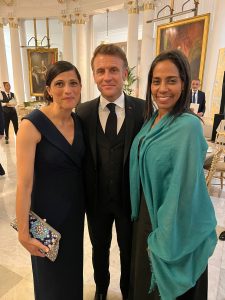 The political momentum for oceans was palpable. It took me back to the days when the Law of the Sea came into force, an exciting time when the whole world recognized the significant role of the ocean for humanity. That moment was, in fact, my inspiration for becoming an oceanographer!
The political momentum for oceans was palpable. It took me back to the days when the Law of the Sea came into force, an exciting time when the whole world recognized the significant role of the ocean for humanity. That moment was, in fact, my inspiration for becoming an oceanographer!
Last week’s high-level plenary interventions were passionate and ambitious in their pursuit of the goals we have set. Meaningful commitments were made, and actions were taken. Several speeches emphasized the need to adhere to international law and uphold multilateralism, as well as the risks of acting alone. President Lula of Brazil mentioned that he was very proud of the ISA team. The United Nations Secretary-General stated that the “deep sea cannot become the Wild West.” I encourage you all to read my official plenary statement here.
The French government committed to reaching 4 per cent “strong protection” by 2026 in its marine protected areas, including a ban on bottom trawling in those areas. In several of my speeches, I informed participants that in the Clarion Clipperton Zone, a part of the Area located between Hawaii and Mexico and under the sole regulatory mandate of the ISA, 1.9. million square kilometres have already been protected from exploitation by being designated as areas of particular environmental interest.
At this Conference, I learned that even among knowledgeable experts, very few were aware that the ISA is the custodian of the only marine protected areas in a space that represents 54 per cent of our global ocean. These areas essentially represent the first high seas protected areas. I am thrilled to note that our sister agreement, the Biodiversity Beyond National Jurisdiction (BBNJ), received a significant boost from the United Nations Ocean Conference 2025, where 18 countries deposited their instruments of ratification, bringing the total to 51 of the 60 required. I am personally cheering for a speedy entry into the force of BBNJ to enable official cooperation towards aligned management of these common areas.
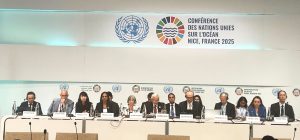
My Ocean Action Panel intervention, “Enhancing the conservation and sustainable use of oceans and their resources by implementing international law as reflected in the United Nations Convention on the Law of the Sea (UNCLOS),” highlighted that synergies and complementarity between ISA and BBNJ will be essential towards reinforcing UNCLOS, the Constitution for our Ocean. We also had a fascinating discussion with other esteemed UNCLOS experts on whether UNCLOS can be sufficiently adaptable to remain fit for purpose in the modern and rapidly changing world. I agreed with the Under-Secretary-General for Legal Affairs and UN Legal Counsel, Elinor Hammarsköld, when she said, “Yes, it is.” I also made the point that effective ocean governance is not an abstract concept—it is a necessity. UNCLOS provides the legal certainty and institutional framework for all States to work together, in good faith, towards a common cause. I invite you to read my full OAP 10 intervention here and to listen to the entire session here.
 We dubbed our team “Small but mighty” as we showed up daily in the plenary, side events and bilateral meetings, as well as at the evening engagements where formalities turned to hard talks and honest discussions on what concrete actions must be taken with both old friends and potential new partners. Of the former, I was thrilled to be reunited with two role models whom I hold so dear to my heart, both of whom I have the honour to call friends and mentors, Dr. Sylvia Earle and United Nations Secretary-General’s Special Ocean Envoy, Ambassador Peter Thomson. Their truly tireless energy and inspiring, no-holding-back advocacy for the importance of recognizing the value of our blue planet always makes me feel positive and hopeful about our future.
We dubbed our team “Small but mighty” as we showed up daily in the plenary, side events and bilateral meetings, as well as at the evening engagements where formalities turned to hard talks and honest discussions on what concrete actions must be taken with both old friends and potential new partners. Of the former, I was thrilled to be reunited with two role models whom I hold so dear to my heart, both of whom I have the honour to call friends and mentors, Dr. Sylvia Earle and United Nations Secretary-General’s Special Ocean Envoy, Ambassador Peter Thomson. Their truly tireless energy and inspiring, no-holding-back advocacy for the importance of recognizing the value of our blue planet always makes me feel positive and hopeful about our future.
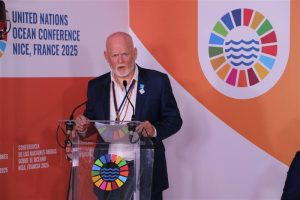

–
For the kick-off, we were welcomed to an event by Dr. Andrew Forrest AO, Executive Chair and Founder of Fortescue and Minderoo Foundation on the world’s first ammonia-powered vessel that is innovating to decarbonize shipping, the Fortescue Green Pioneer. Dr. Forrest is a highly successful terrestrial miner from Australia, and I had the opportunity to hear some of his ideas on how they support mining ventures with an eye towards optimizing sustainability both on the ground and at the policy level. I believe that the ISA can benefit from consultations with business leaders who are pioneering successful industry ventures in the sustainability-extractives nexus.
When it comes to successful entrepreneurs who make giving back to people and the planet a top priority, at the kind invitation of Markus Reymann, Director of TBA21 Foundation and Francesca Thyssen-Bornemisza, Chair of TBA21, I had the absolute privilege of meeting Sir Mohammed Ibrahim. Sir Ibrahim needs no introduction as the Founder and Chair of the Mo Ibrahim Foundation, which is well known for its work on advancing governance and leadership in Africa. I look forward to continuing these discussions on areas for potential collaboration, from the facilitation for African scientists and experts to participate in the activities from the ISA Action Plan on Marine Scientific Research to building up our ISA initiatives so that the African perspective is well represented and ensuring that African countries are present and actively engaged in the negotiations in Kingston, Jamaica.
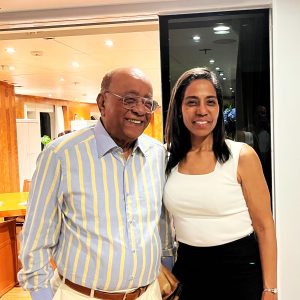
I also very much enjoyed the Abyss Talks, hosted by TBA21, which brought together the thought leaders from law, conservation and science to debate the potential implications of deep-sea mining for islanders and the environment.
I take the opportunity here to be very blunt. I am well aware of the perspective and concerns about the ISA Secretary-General attending NGO events or hearing from companies, organizations and individuals that have an anti-mining stance. However, five months ago, I committed to full transparency, accountability and inclusivity. To me, this means giving all stakeholders a seat at the table and welcoming all viewpoints for debate. I will engage equally with pro- mining industry, economists and experts to better understand their perspectives and expectations. As the Secretary-General of an intergovernmental body like the ISA, my duty is very clear: to facilitate constructive dialogue and negotiations to achieve consensus on the way forward. It is, therefore, not for me to articulate a position for or against deep-sea mining. This is a decision that lies squarely with countries, which will need to navigate based on the best available science, market needs, economics, environmental concerns and peer-to-peer consultation with their constituents. I am here to support and act as a fair and neutral broker. So, expect to see me engaging with a range of diverse actors to share information, acquire knowledge and explore how we can build ISA capacity through partnerships.
I sincerely thank all my colleagues for identifying fantastic side events and bilateral opportunities and for positioning me well in constructive arenas, thereby raising awareness and exchanging knowledge about the ISA’s mandate.
For Women Leading Ocean Action, I had the great pleasure of meeting a group of prominent women in leadership across the ocean, cities and science, hosted by the United Nations Office for Partnerships and Bloomberg Philanthropies. A highlight was being seated next to the Mayor of Paris, Ms. Anne Hidalgo, and the First Lady of Brazil, Rosângela Lula da Silva, lovingly known to us Brazilians as Janja. We shared the belief in the power of women to solve some of the world’s most pressing challenges and that the female superpower is the ability to articulate and execute our vision with values rooted in pragmatism and empathy.
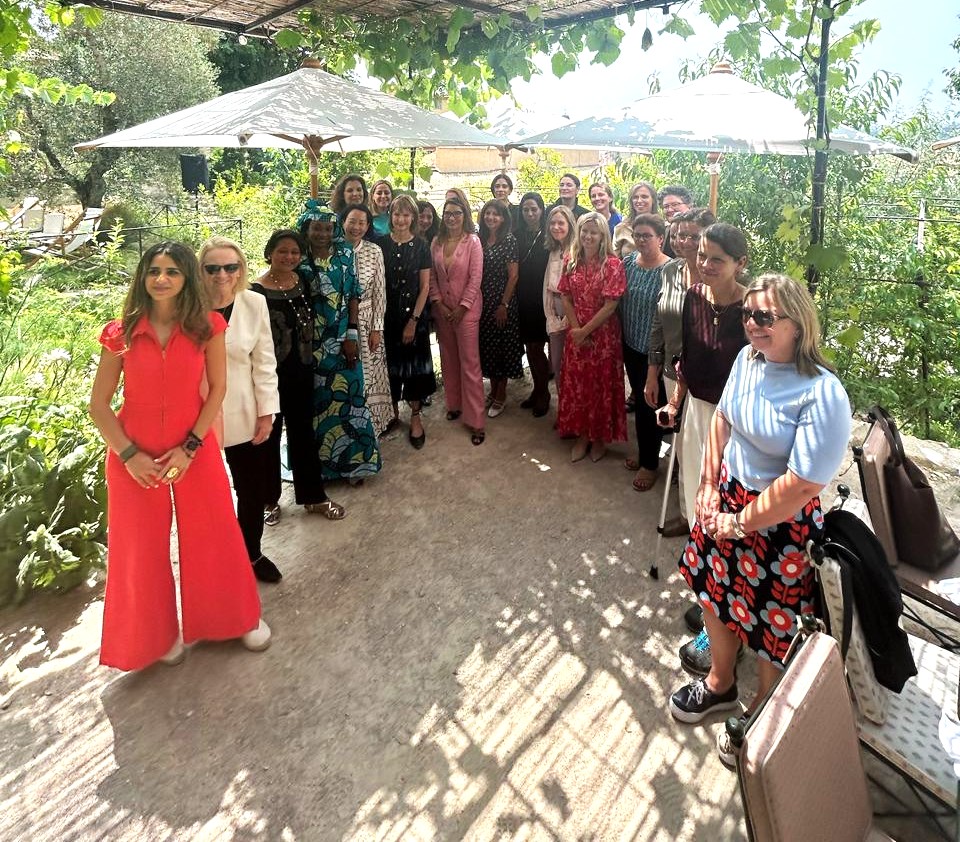
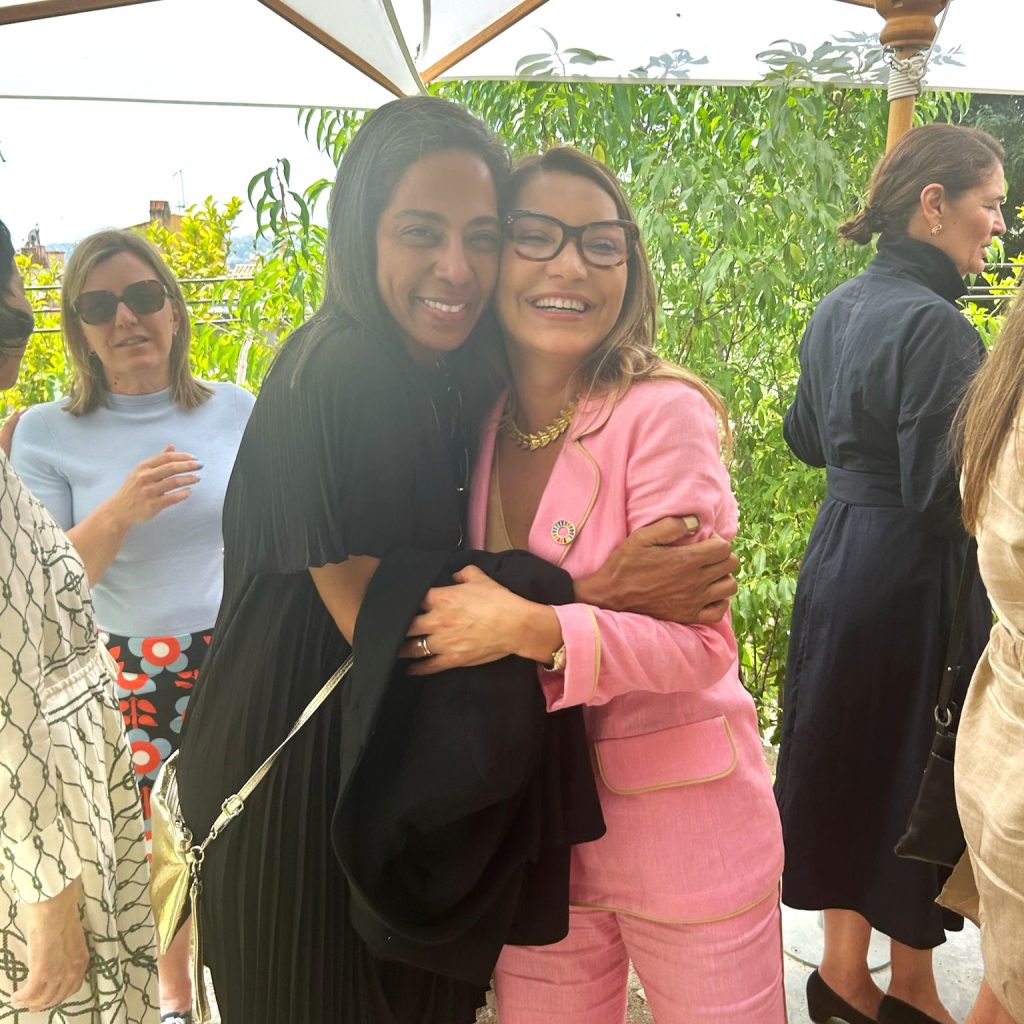
I provided opening remarks alongside UNESCO-IOC Executive Secretary Vidar Helgesen and China’s Vice Minister for Natural Resources at the “Approaching an intelligent and inspiring ocean: new science-based actions for sustainable futures” event. This event, organized by the China Deep Ocean Affairs Administration, Mercator Ocean International, the Global Ocean Observing System and the International Ocean Institute, exemplified global partners coming together to champion the open sharing of ocean data, digital technologies and information products. Enhanced access to these resources is essential for informed decision-making and empowering the global community to address the pressing challenges of ocean governance. ISA is proud to support the excellent work being done. My call to action was that we must increase investments in science and technology and ensure that national and regional research agendas are aligned with the ISA Action Plan for Marine Scientific Research, endorsed by all 169 Member States in 2020.
For Making Waves from Paris to Belém, organized by the Ocean Climate Platform and the Ocean Conservancy, I joined esteemed colleagues, including my former boss, H.E. Marina Silva, Minister of Environment and Climate Change, Brazil as well as H.E. Chris Bowen, Minister for Climate Change and Energy, Australia and Ms Janis Searles Jones, CEO, Ocean Conservancy, on the panel “Turning the Tide: Moving from Commitments to Implementation of Ocean Climate Action.” We discussed the importance of upholding the value of multilateralism and strategic synergies across the ocean, climate, and biodiversity to avoid silos, inefficiencies and unilateralism that can undermine efforts to work as a global community. I also welcomed Brazil’s launch of the Blue NDC Challenge as a vital step forward in ensuring that national climate plans reflect the ocean’s central role in regulating the climate.
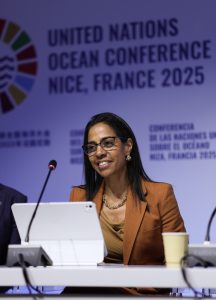
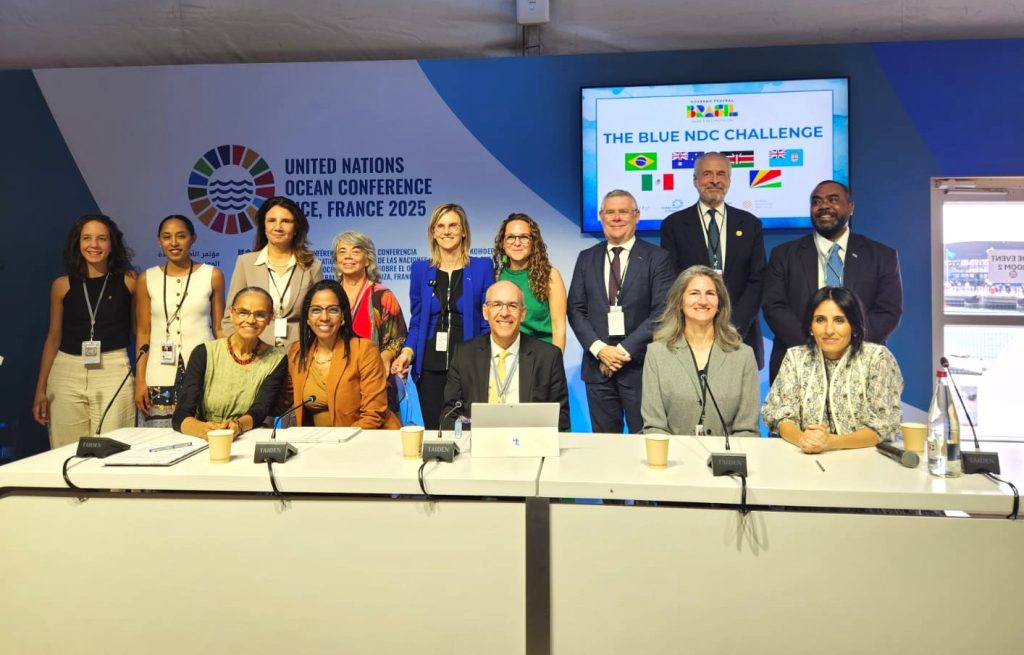
Together with the Vice Minister of Natural Resources of China, the Executive Secretary of the IOC-UNESCO and others, I provided words of support for the exciting launch of COAST – Coastal City Ocean-based solution toolkit for sustainable development. It also gave me the opportunity to communicate ISA’s belief that capacity development is not a one-way process but a platform for mutual learning, collaboration and solidarity. Through regional centres and joint initiatives, we are cultivating networks where Member States can share lessons learned, build trust and co-develop practical tools for sustainable ocean management. I applaud these great minds for their efforts.
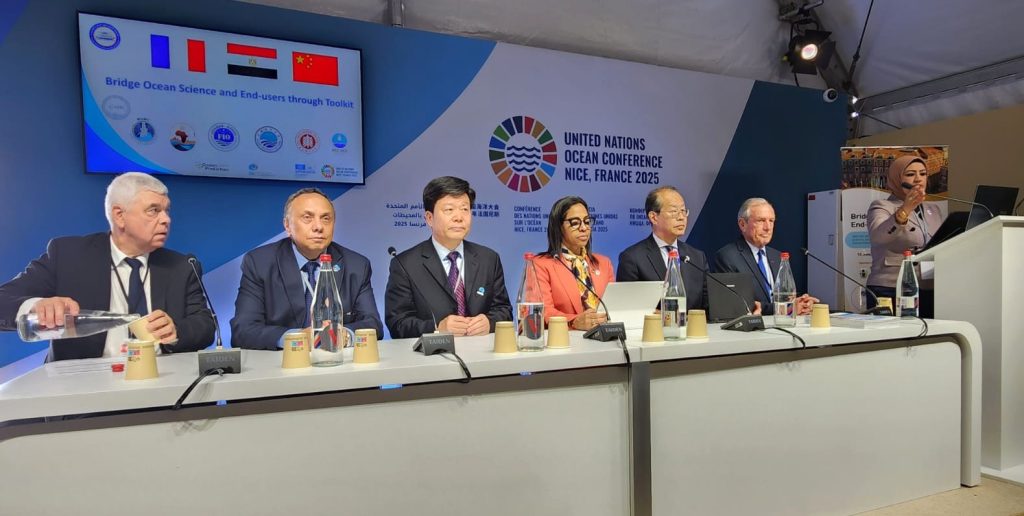

An absolute highlight was the launch of the ISA and Republic of Korea Deep-Sea BioBank. Huge gratitude to the team for a first-class event that continued to grow in significance among dignitaries until the very last moments due to the immense interest in our topic. In addition to my opening remarks, our high-level speakers included Prime Minister of the Cook Islands, H.E. Mark Brown, Deputy Minister of Oceans and Fisheries, the Republic of Korea, Mr. Sungbum Kim, Secretary of the Ministry of Earth Sciences of India, H.E. Dr. M. Ravichandran, Additional Secretary, Head of Maritime Affairs Unit, Ministry of Foreign Affairs, Bangladesh, Commodore Sheikh Mahmudul Hassan, H.E. Evelyn Ndlovu, Minister of Environment, Climate and Wildlife for Zimbabwe and the Executive Secretary of the Convention on Biological Diversity, Astrid Schomaker. ISA’s Changsung Lim did a terrific job of moderating, and José Dallo Moros did an excellent job of unpacking the exciting details. We thank each and every one of our speakers who made very thoughtful and supportive interventions on the Initiative and for their interest in joining hands more closely with ISA.

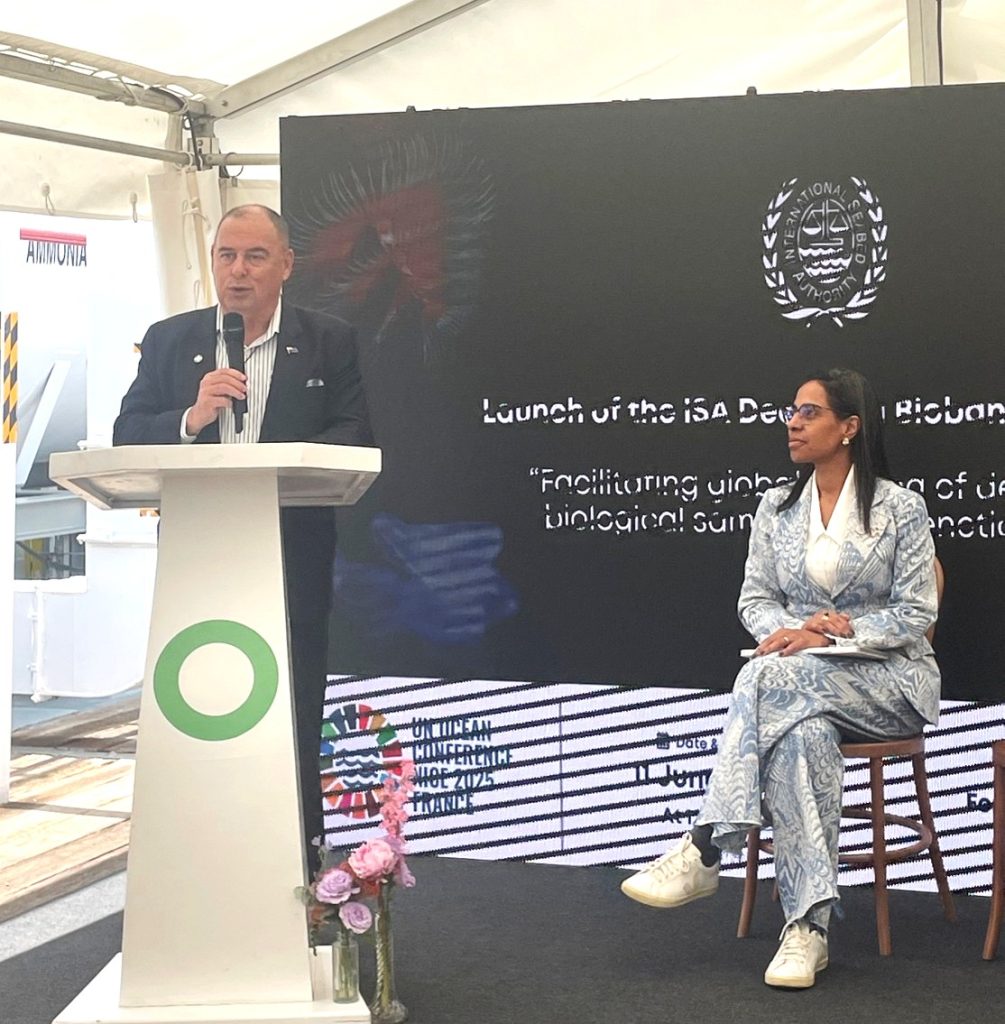 I made the point that this Initiative is ISA’s response to a growing need to advance research, share data, build capacity and facilitate access to deep-sea knowledge, particularly for developing States. I affirmed that ISA currently has the best available science acquired through the efforts of our experts and contractors, and we are keen to make it widely accessible to all. To achieve this, we require partners and funding that can effectively manage and transform data into actionable knowledge. I sincerely hope that those in a position to support these efforts will join us! To this end, I reference below two new partnerships that will do just this.
I made the point that this Initiative is ISA’s response to a growing need to advance research, share data, build capacity and facilitate access to deep-sea knowledge, particularly for developing States. I affirmed that ISA currently has the best available science acquired through the efforts of our experts and contractors, and we are keen to make it widely accessible to all. To achieve this, we require partners and funding that can effectively manage and transform data into actionable knowledge. I sincerely hope that those in a position to support these efforts will join us! To this end, I reference below two new partnerships that will do just this.
Through this Initiative, we aim to create standardized and equitable pathways for scientific collaboration, empowering nations and institutions to explore, understand and protect the ocean’s most remote ecosystems. We are pleased to be partnering with our dear colleagues from the Republic of Korea, who are globally recognized for their innovative technologies and will co-host, along with Chile, the fourth United Nations Ocean Conference in 2028.
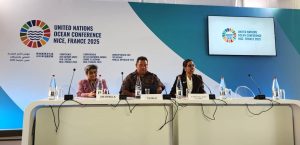 My final side event was “Blue Horizons: Advancing Ocean Action for Least Developed Countries, Landlocked Developing Countries, and Small Island Developing States,” organized by the Office of the High Representative for the Least Developed Countries, Landlocked Developing Countries and Small Island Developing States and the Permanent Mission of Bolivia. This event provided the opportunity for us to highlight that ISA is guided by the principle that the resources of the deep seabed beyond national jurisdiction, the Area, are the common heritage of humankind. This principle calls for inclusive governance, equitable benefit-sharing and meaningful participation of all States, especially those with the greatest need. This is why we have made capacity development and technology transfer a cornerstone of our mission. Looking ahead, ISA is committed to being aligned with the Doha Programme of Action for LDCs, the Antigua and Barbuda Agenda for SIDS, and the Awaza Programme of Action for LLDCs for the Decade 2024–2034. We view these frameworks as essential road maps for ensuring that no country, whether coastal, island or landlocked, is left behind in the ocean economy.
My final side event was “Blue Horizons: Advancing Ocean Action for Least Developed Countries, Landlocked Developing Countries, and Small Island Developing States,” organized by the Office of the High Representative for the Least Developed Countries, Landlocked Developing Countries and Small Island Developing States and the Permanent Mission of Bolivia. This event provided the opportunity for us to highlight that ISA is guided by the principle that the resources of the deep seabed beyond national jurisdiction, the Area, are the common heritage of humankind. This principle calls for inclusive governance, equitable benefit-sharing and meaningful participation of all States, especially those with the greatest need. This is why we have made capacity development and technology transfer a cornerstone of our mission. Looking ahead, ISA is committed to being aligned with the Doha Programme of Action for LDCs, the Antigua and Barbuda Agenda for SIDS, and the Awaza Programme of Action for LLDCs for the Decade 2024–2034. We view these frameworks as essential road maps for ensuring that no country, whether coastal, island or landlocked, is left behind in the ocean economy.
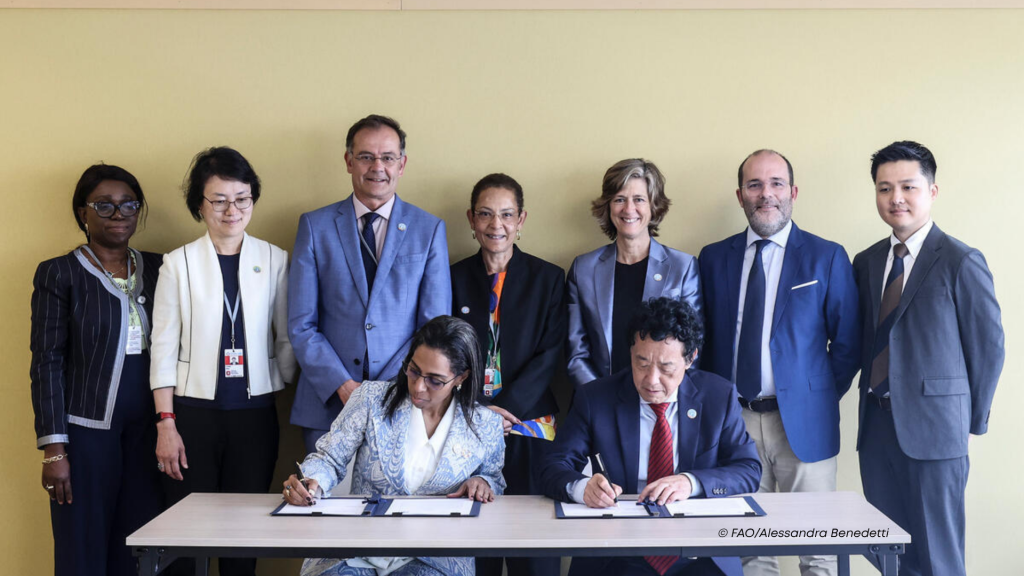 Beyond these events, colleagues also provided remarks or moderation for a number of other panels, from “Advancing the Blue Economy and Sustainable Ocean Development through Marine Spatial Planning and United Nations Oceans” as a mechanism to mobilize multilateral ocean action and amplify collective impacts towards the implementation of SDG 14.
Beyond these events, colleagues also provided remarks or moderation for a number of other panels, from “Advancing the Blue Economy and Sustainable Ocean Development through Marine Spatial Planning and United Nations Oceans” as a mechanism to mobilize multilateral ocean action and amplify collective impacts towards the implementation of SDG 14.
We signed a memorandum of understanding with the FAO Director General, Mr. Qu Dongyu, highlighting the need for a more coherent and coordinated approach to managing activities in areas beyond national jurisdiction through stronger collaboration between the competent intergovernmental organizations to implement the BBNJ. Director General Dongyu said, “We look forward to working together in addressing future challenges and opportunities through strengthened collaboration in advancing knowledge, sustainable management and inclusive approaches.”
I would like to point out here that SIDS depend on economic activities from the sea, both within and outside their national jurisdictions. Finding viable solutions through well-regulated activities that can deliver tangible benefits for current and future generations is absolutely essential, particularly in the face of pressures from climate change and sea level rise.
With the Danish Hydrological Institute’s (DHI) CEO, Mette Vestergaard, ISA signed a Letter of Cooperation that will focus on three key areas: 1) data management for decision-making, 2) regional planning and monitoring and 3) capacity development. DHI’s CEO said, “The international seabed area is of vital importance to us all. With this partnership agreement, we are one step further in ensuring that decisions about the seabed are guided by science and based on knowledge about the impact on the environment.”
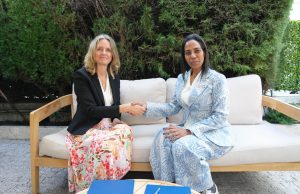
We look forward to sharing more information on the ambition for these partnerships in the coming months.
Our programme for bilateral engagements, both official and impromptu, was extremely rigorous and highly productive across the government, civil society and private sector. We are grateful for the time these diverse stakeholders took to discuss a wide range of topics, from their individual concerns and objectives to better ways to collaborate and tangible next steps for deepening the relationship with ISA.
- Bangladesh, Additional Secretary, Head of Maritime Affairs Unit, Ministry of Foreign Affairs, Mr. Commodore Sheikh Mahmudul Hassan (Retd)
- Brazil, Ambassador Kosendei and the Director of the Division of Ocean and Antarctica, Counsel Maite
- China, E. Mr. Shuxian SUN, Vice Minister of Natural Resources of China
- China, Yang LIU, Deputy Director General of the Department of Treaty and Law, Ministry of Foreign Affairs
- European Parliament
- EU Commissioner for Fisheries and Oceans, Mr. Costas Kadis
- Federal German Minister for the Environment, H.E. Mr. Carsten Schneider
- Executive Secretary of the Convention on Biological Diversity, Ms. Astrid Schomaker
- Secretary of the Ministry of Earth Sciences of India, H.E. Dr. Ravichandran
- Minister of Foreign Affairs and Foreign Trade of Jamaica, H.E. Senator Kamina Johnson-Smith
- Republic of Korea, Minister of Oceans and Fisheries, H.E. Mr. Do-hyung Kang
- Permanent Representative of Malta to the United Nations, H.E. Ms. Vanessa Frazier
- Minister for Climate Change and National Resilience of Nauru, Mr. Asterio Appi, MP
- Non-resident Permanent Representative of Nauru to the ISA, H.E. Ambassador David Aingimea
- Minister and Vice-President of Spain, H.E. Ms. Sara Aagesen
- Secretary-General from the Permanente Commission for the Pacific South, Ambassador Ms. María Elvira Velásquez Rivas Plata
- UNESCO-IOC and Chair Sasakawa from Nippon Foundation, Mr. Vidar Helgesen
- United Nations Special Rapporteur on the human right to a clean, healthy and sustainable environment, Mr. Astrid Puentes Riaño
- CEO of Ocean Conservancy, Ms. Janis Searles Jones
- Oceans and Us, Farah Obaidullah
- University of California Santa Barbara, Salesforce, Mr. Douglas MacCauley

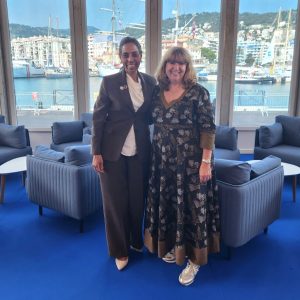
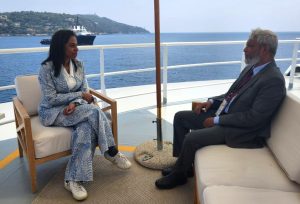
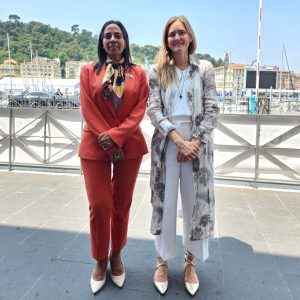
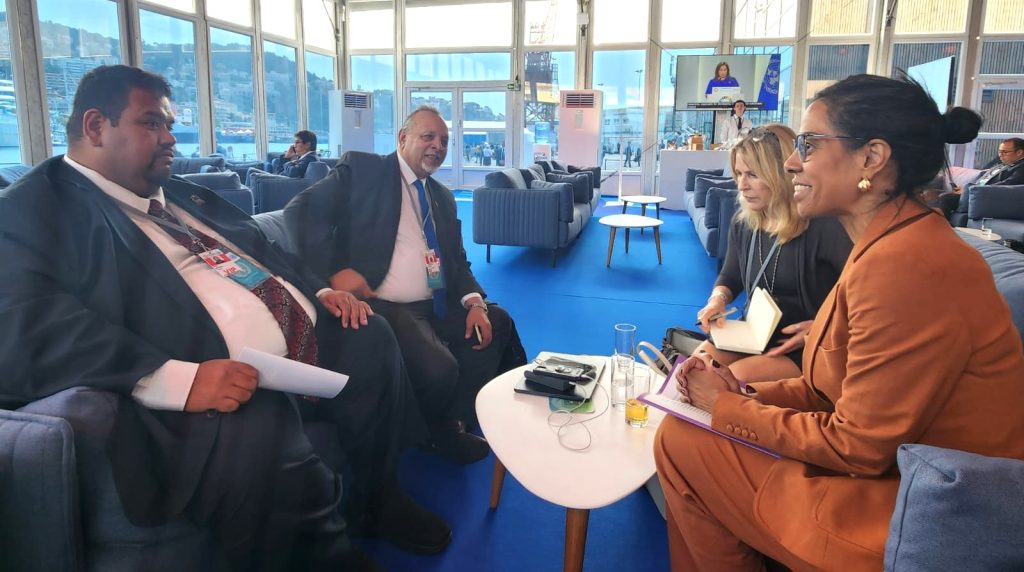
Last but not least, my opinion editorial in The Economist, The Deep Sea Needs Rules, ran on 12 June. This very high-profile, widely-read publication gave me the opportunity to say that while my role as Secretary-General must be impartial, my position is that parties to UNCLOS and ISA need to deliver a strong, science-based regulatory regime that will ensure effective governance of the future exploitation of mineral resources in the deep sea and protect the marine environment in line with the 2023 road map.
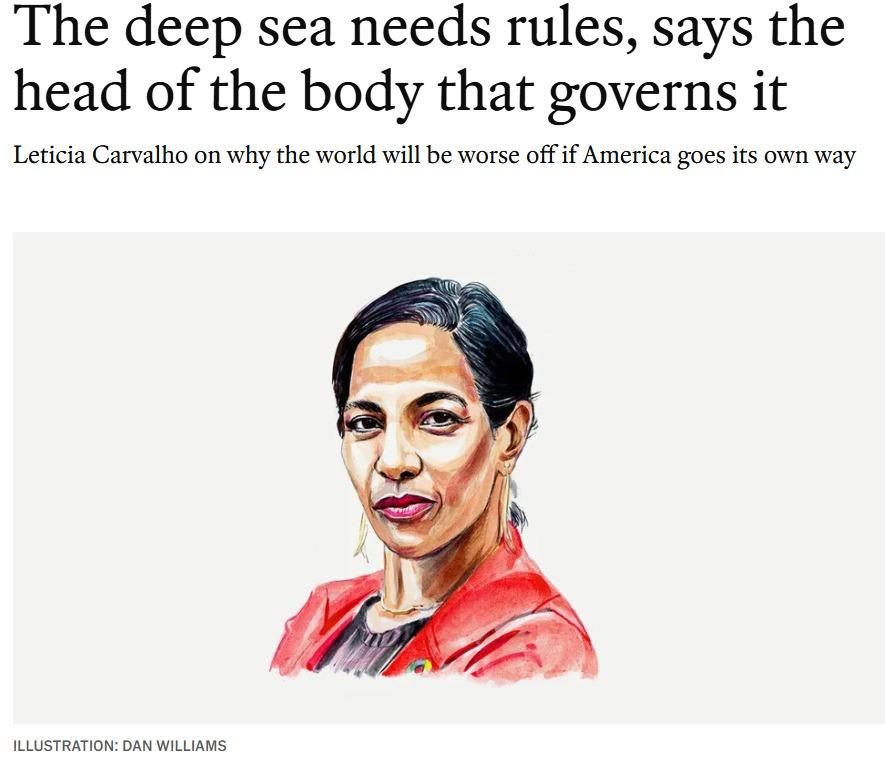
While we need to be clear-eyed about the challenges facing the ocean, as well as the complexity and polarization surrounding our own mandates, my takeaway on the potential for a truly sustainable blue economy was immensely positive.
I left the Conference full of hope for a future with more research, technology, and innovation in the ocean space, and, crucially, greater resources from new ocean users and stakeholders being brought to the table for advancing ocean protection and activities aligned with achieving a sustainable blue economy.
As part of our efforts to support the United Nations Ocean Conference milestones, our voluntary commitment is to provide Member States with the highest level of support towards their ambitious goals. Our mission now, as the Secretariat, is to ensure that ISA Member States have a productive part II of the thirtieth session and are able to make progress on delivering the intentions they set forth in the 2023 road map.
I took every opportunity to urge all Member States to attend our next Council meeting in July with values rooted in pragmatism and deliver a solid, strong and science-based regulatory regime. This regime will ensure the effective governance of mineral resources in the deep sea and protect the marine environment for our and future generations.
I cannot wait to welcome the entire ISA family, Member States, observers, stakeholders, press, youth and Indigenous groups to Kingston, Jamaica, the gravity centre for ocean governance, in July 2025, where we will have the opportunity to celebrate ISA´s 30th anniversary and make great progress!
Leticia Carvalho
Madam Secretary-General, International Seabed Authority

